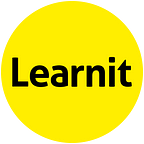Dear global education leader,
Not long ago, many educators warned us not to use the phrase “lost learning” to refer to all the academic learning that didn’t take place during various lockdowns and school closures. Students had been through enough, socially, emotionally and academically, to then be reminded they were probably also way behind. But whether we call it ‘learning loss’ or ‘catch up’ or ‘recovery’, the truth is that we need to know where students are and decide how we get them to where we think they need to be.
Which is one of the reasons I found this week’s podcast guests, Caitlin Baron, founder and CEO of the Luminos Fund, and Alex Hailu Gebre, Luminos’ country director and regional strategic advisor for Ethiopia, so compelling.
The Luminos Fund is an education non-profit that aims to get the most marginalized students into mainstream schools in Ethiopia, Liberia, Lebanon and soon Ghana. It uses an accelerated, joyful learning program targeting out-of-school 10-year-olds — some of whom have never been part of the school system — with the goal of getting them up to speed so they can join grade four.
According to research from the University of Sussex, which has tracked the group’s impact since its inception, 90% of Luminos students advance to mainstream school and their students finish primary school at twice the rate of their government-educated peers. It’s worth pausing on that: Luminos takes kids who have dropped out, mostly due to extreme poverty, and delivers up to three years of learning over just 10 months, before returning students to mainstream education, where they stay in school at double the rate of those who never dropped out in the first place.
“So much of what we’re doing is actually empowering teachers to be really thoughtful about ‘how can I look closely at each child as an individual, and understand what they know and don’t know and meet them where they are’. And that’s a core principle of just good education everywhere, right?” Caitlin says.
Luminos employs obvious strategies that allow for a more effective delivery of learning: at a cap of 25, classes are about half the size of Ethiopia’s national average; the school day and week are longer; students are learning basics but at older ages, so they are more developmentally advanced; and the curriculum covers fours times more literary instruction than would be covered in a government school.
It also reimagines who can teach and how they should do that. Luminos trains community members to be teachers, and inspires them to use a joyful approach. “It’s not that anyone has the intention to make education dull and lifeless and stressful,” Caitlin says. “But if that’s the system you’ve come through, in essence, that’s what you know and unless you have a program and a training approach that can give teachers new and different ideas for engaging children differently, we can’t expect anything different.”
Luminos’ approach uses blunt instruments like testing how many words each child can read every week, so every teacher always knows the level of each student. And it spends time with students and families on building the idea of being a learner.
Alex tells the story of one mother who married off two daughters early but sent her third girl to an accelerated learning program. During Covid-19, the neighbours pressured the mother to marry off the daughter, which would have benefited the family. But because teachers were from the community, they hosted microclasses and outdoor learning within the community, allowing students to continue learning.
Of course, there are millions who will have faced the same situation and had to drop out of school. Which is why governments around the world need to think creatively about how they catch kids up, both socially and academically. No government can be blamed for the exogenous shock of Covid-19, but they can be blamed for how they react to it. Will they default to an ineffective status quo, or embrace innovations around catch up (here’s a useful chart from UNHCR showing all the different kids). Will they find ways to reduce the barriers for the most marginalized students and creative ways to recruit and train teachers? And will the philanthropic community step up to fill in much needed funding gaps?
“We have a gift of profound empathy at this moment,” Caitlin said, “because the whole world saw what exclusion from school really means, not just academically but socially and developmentally.”
The question is, what will we, and what will governments do with that empathy?
Stay curious,
Jenny
🎙 LISTEN FURTHER: CAITLIN BARON & ALEMAYEHU HAILU GEBRE, LUMINOS FUND
